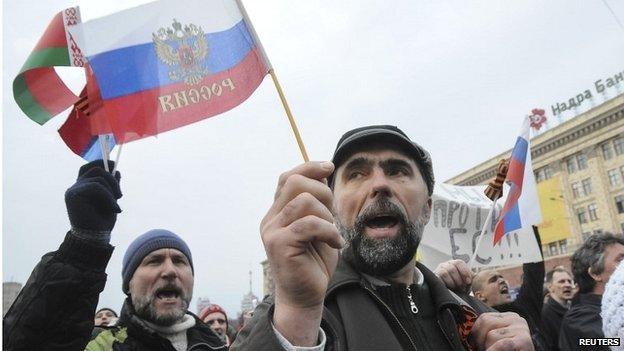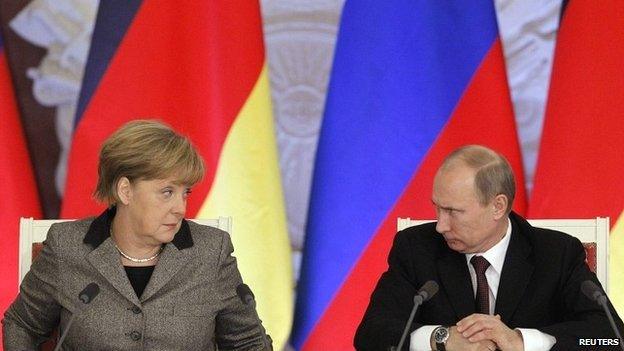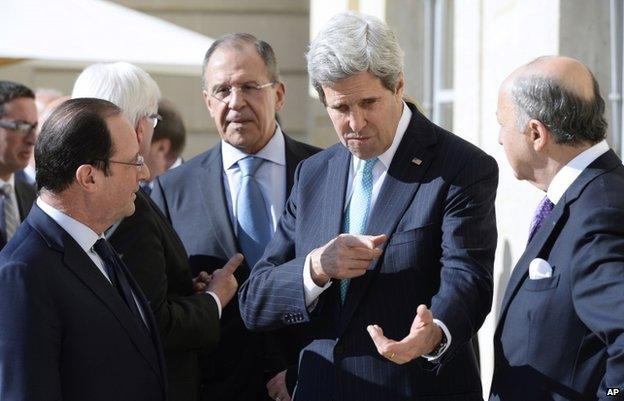Ukraine crisis: Europe's leaders respond to Russia
- Published
- comments

Pro-Russian demonstrators at a rally in Ukraine's second city of Kharkiv
Events have stripped Europe's leaders of their illusions. They are gathering in Brussels for an emergency summit on Ukraine in a sombre mood.
The heady rhetoric of European officials declaring "the future of Ukraine belongs with the EU" has long been discarded. The image of protesters waving EU flags has faded. The understanding of the protests, which included nationalist groups, is far more nuanced.
As Europe's leaders meet there is widespread understanding that if the crisis is to be defused then the tug of war between East and West over Ukraine's future will have to end. As the former US Secretary of State Henry Kissinger wrote: "If Ukraine is to survive and thrive it must not be either side's outpost against the other - it should function as a bridge between them."
At the summit there will be two instincts; to punish Russia for having violated the independence and sovereignty of Ukraine and the need to lure Russia into constructive dialogue and lower tension.
As often in Europe there are divisions. Many of the countries from Eastern and Central Europe, which know the Russian playbook only too well, want Russia to pay a price.
They believe, like the Americans, that the only weapon that will get Moscow's attention is economic isolation. Then there are others, most notably the Germans, who believe sanctions will be counter-productive; that the crisis will only be defused through dialogue.
Economic reality
Germany is arguably a more important player in this than the United States. Angela Merkel has already spoken to President Putin on six occasions. The two countries have a special economic relationship.
More than a third of Germany's gas comes from Russia and 10% of Russia's imports are from Germany. Although Chancellor Merkel, having grown up in East Germany, knows the mindset of men like Putin she believes that sanctions are unlikely to work. They will not de-escalate tension and will invite retaliation.
But some European leaders are already questioning what all the phone calls have achieved. They fear that when President Putin looks at the West he spies weakness and that the EU, which provides the largest amount of inward investment in Russia, must show some spine to bend minds in Moscow.

Angela Merkel does not believe that sanctions will force President Putin's hand in Ukraine
But there is also economic reality. That is perhaps best underlined by the position of the UK - as revealed in the photographed document as it was carried into Downing Street. Britain believes there must be "costs and consequences" for Russia but they should not extend, for now, to trade sanctions and certainly not to measures that would undermine the City of London as Russia's favourite financial centre.
So Europe's leaders are likely to opt for a compromise; freezing talks on trade liberalisation and easing of travel restrictions. They might also impose sanctions on certain individuals or companies but, at this stage, Europe is not expected to push for more punitive sanctions.
The key relationship at this summit will be between Germany and Poland. Germany has the economic clout with Moscow; Poland - also with its experience of the Soviet empire - will be wary of signalling weakness and division.
Direct talks
So somehow Europe's leaders will have to send a strong message of disapproval whilst keeping open the door for engagement with Russia.
The West's strategy, as displayed in Paris yesterday, is to get the new Ukrainian government and the Russians to talk directly. They are not yet in a room together and UK Foreign Secretary William Hague said the meeting with the Russians had been very difficult and there was no framework for direct talks between the two sides.

Russia's Sergei Lavrov (back) with John Kerry, French President Francois Hollande (L) and Laurent Fabius
The problem for Moscow is that it has already denounced the new government in Kiev as illegal and unrepresentative.
The Russians still want to return to the 21 February agreement brokered by the foreign ministers of Germany, France and Poland which, incidentally, Russia declined to sign, but which, in their view, offers the prospect of a national unity government and consultation with the regions. Russia would be looking for a high degree of autonomy and protection for pro-Russian areas.
In very broad terms the Europeans and the Russians understand that the only solution will be a federal structure for Ukraine with the country linked to Russia via a customs union and linked also to the EU via an association deal.
History and geography, as always, cannot be ignored. There are strong historic ties with Russia and yet also a yearning on the part of many to belong to mainstream Europe. But neither East nor West can dominate Ukraine without prolonging the crisis.
